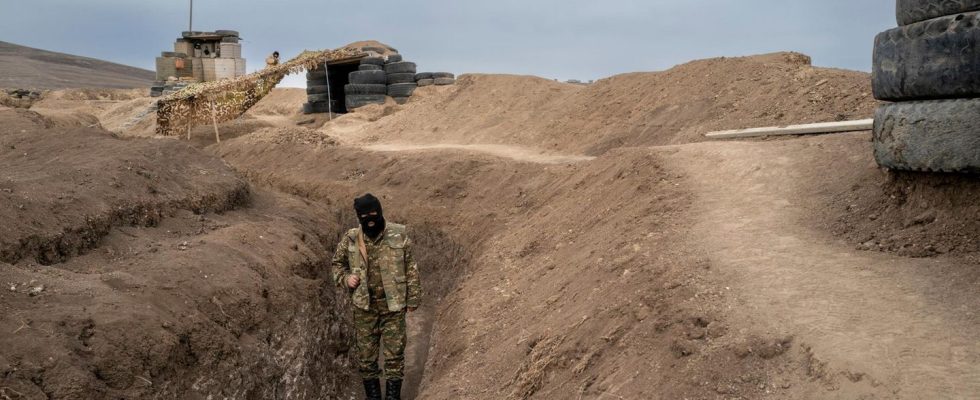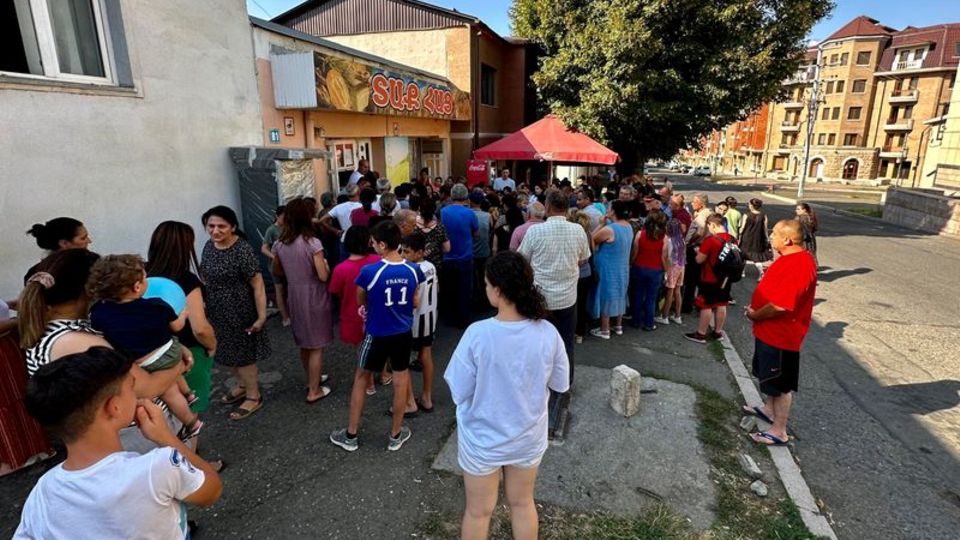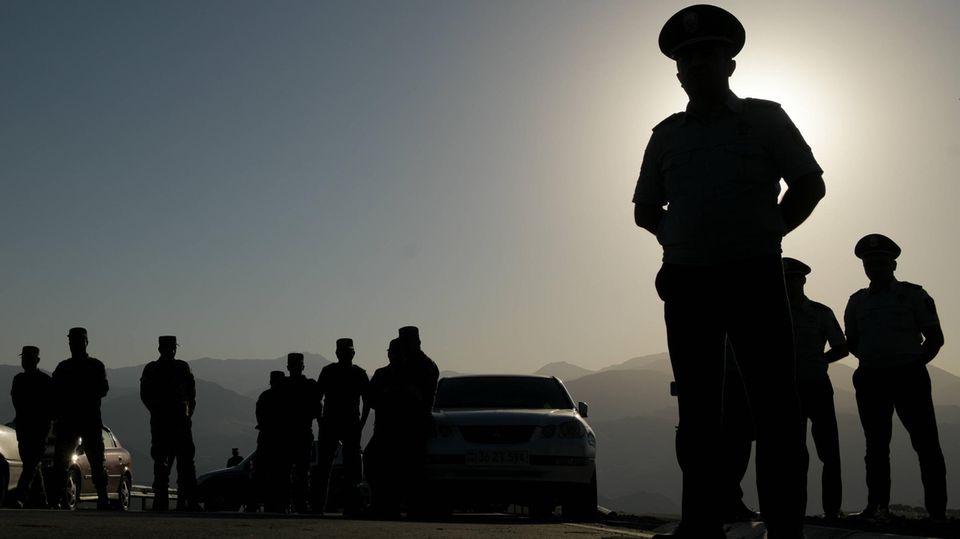The situation is getting worse in the South Caucasus: Azerbaijan has moved soldiers to the border with Armenia and is continuing to block the Nagorno-Karabakh enclave. Armenia has its back to the wall and is partly to blame for the poor situation of the Karabakh Armenians, says South Caucasus expert Stefan Meister.
Nagorno-Karabakh is a region in the South Caucasus and is about the size of Saarland. The territory has been populated by a majority of Armenians for centuries, but lies within the territory of neighboring Azerbaijan. The question of who owns this small piece of land repeatedly leads to wars and has cost countless people their lives.
Review: In 1921, the South Caucasus was part of the Soviet Union, and dictator Stalin decided that Nagorno-Karabakh should be part of Azerbaijan. After the collapse of the Eastern Bloc, the conflict flared up again. In a bloody war in 1994, the Armenians regained control of the area and the Republic of Nagorno-Karabakh was formed, with the area remaining part of Azerbaijan under UN law. A situation that never defused the conflict. In the second major war in 2020, Azerbaijan regained the upper hand and recaptured the seven surrounding regions occupied by Armenia as well as parts of Nagorno-Karabakh.
After a ceasefire brokered by Russia, Armenia then had to cede large areas to the militarily superior Azerbaijan. But the ceasefire remained fragile, tensions are now rising again and hatred on both sides is great. Since the summer, the Azerbaijani government has blocked the Lachin corridor, the only route through which Armenia could supply Nagorno-Karabakh. Experts see signs of genocide and fear that a new war will break out in the region. For the star says Eastern Europe, Russia and Central Asia expert Dr. Stefan Meister assesses the situation.
Mr. Master, the Azerbaijani military has been blocking the only Armenian access road to Nagorno-Karabakh since July. Food and medicine are missing. The humanitarian situation is said to be catastrophic. Two weeks ago, Azerbaijan also moved military equipment and soldiers to the border with Armenia. Is a war imminent on the edge of Europe?
I had actually expected a military escalation last week. Apparently, Azerbaijan has decided against an attack for the time being and has primarily created a threatening backdrop with the military deployment.
Why?
It is difficult to say; it can be assumed that an attack is more likely to occur against Nagorno-Karabakh than against Armenia. However, there is still a possibility that Azerbaijan could also attack Armenian territory. However, Azerbaijan cannot do this without permission from its most important partner, Turkey. And Russia would also have to agree to this. Turkey, whose history is linked to the Armenian genocide at the beginning of the 20th century, is an important ally and arms supplier to the Azerbaijanis and also contributes to their military superiority over the Armenians.
What does the Azerbaijani government want to achieve with this threat?
The main goal is clear: Azerbaijan wants to take complete control of Nagorno-Karabakh. But due to international pressure from previous attacks on the disputed area, the Azerbaijani government is apparently relying on salami tactics.
Azerbaijan is trying to use various means to build pressure.
Exactly. Since December last year, access to Nagorno-Karabakh has been partially blocked and completely closed. Supply shortages are now building pressure on the Karabakh Armenians, and with the renewed increased military presence on the Armenian border, the Azerbaijanis want to get the government in Yerevan to accept their demands without compromise.
What demands are these?
A peace agreement in which the political leadership of Nagorno-Karabakh recognizes the governance of Azerbaijan – without security guarantees for the Armenian population and without international troops on site.
What would it mean for Karabakh Armenians if Azerbaijan takes control of Nagorno-Karabakh?
I would say that no Armenian is safe under Azerbaijani leadership. There have already been cases in which Armenians have been ill-treated by Azerbaijani security forces at border crossings. I know that sounds radical, but people’s hatred of each other is so great that peaceful coexistence doesn’t seem possible at the moment. For the Karabakh Armenians, it would therefore be a matter of survival under Azerbaijani rule. Evictions could also occur.
Luis Moreno Ocampo, the former chief prosecutor of the International Criminal Court, is already talking about a genocide against the Karabakh Armenians in view of the Azerbaijani blockade of Nagorno-Karabakh. Do you agree with him?
We should be careful and not use the term “genocide” in an inflationary way so as not to devalue it. I cannot imagine that Azerbaijan will permanently accept an area on its territory in which the majority of Armenians live. The blockade has led to food shortages and, in some cases, hunger. Even though it was decided in recent negotiations, also under pressure from the USA and the EU, that aid deliveries should reach Nagorno-Karabakh, I do not see any desire on the part of the Azerbaijani government to seriously improve the humanitarian difficult situation of the Karabakh Armenians.
Armenia appears powerless and unable to defend itself. Why is Azerbaijan so much more powerful in this current conflict?
Armenia has relied on Russia as a security partner for the past few decades. But Russian interests have changed since February 2022: the Ukraine war is devouring Putin’s military resources; Because of Western sanctions, Russia needs the north-south corridor to Iran, which goes via Azerbaijan; and Moscow needs Turkey as an alternative trade route and to circumvent sanctions. So Putin is ready to make compromises at the expense of the Armenians. This also means that the so-called peacekeepers that Russia has stationed in Nagorno-Karabakh remain passive.
Does Armenia have no other allies?
In principle, Armenia is completely dependent on Russia in terms of energy policy, economy and military. The Armenian elites should have seen earlier that this foreign policy focus on Russia is a mistake. Instead, the previous governments did not want to change the status quo, i.e. the foreign policy focus on Russia. Until 2020 it was more advantageous for Armenia. But they overlooked how Azerbaijan massively built up its military and cooperated even more closely with Turkey. Armenia has, to some extent, maneuvered itself into this dead end and did not take advantage of the phase when it was stronger to negotiate a peace treaty that was more advantageous to itself.
Now Iran has offered the Armenian government help in the form of weapons. Could this improve the situation of the Armenians?
This will not change Armenia’s difficult situation. But it makes it clear that Armenia is, so to speak, on the same side as the “losers” of geopolitics. Like Russia, Iran is under massive Western sanctions. If the Armenian government continues to cooperate only with these outlawed states, they will certainly not create any room for maneuver in geopolitical terms in the long term. At the same time, there are hardly any alternatives.
Doesn’t this situation offer the EU the opportunity to mediate in the conflict and thus gain influence in the South Caucasus?
Russia now tied up in Ukraine would actually be an opportunity for the EU to play a more important role in peace negotiations. In order to become an important player in the region, the EU would have to create room for maneuver for a peace agreement and its implementation. So above all, build up economic room for maneuver with Azerbaijan and be prepared to send a peace mission to the region.
What is the EU doing in the region then?
The EU is already more active than before. It has stationed a civilian observation mission in Armenia. And there is a direct negotiation format between the conflicting parties, called Charles Michel. This is the first time the EU has been involved in the negotiations. But that is not enough to put pressure on Azerbaijan. Instead of being a real negotiator, the EU only takes half a step and is a neutral mediator between the conflicting parties. The main problem for Brussels is that there is a lack of support, especially from the large member states.
In view of this situation, which is partly self-inflicted, Nagorno-Karabakh seems lost for the Armenians.
This can be assumed, and Armenian Prime Minister Nikol Pashinyan has already officially recognized this. Now it’s just a matter of negotiating security guarantees for the Karabakh Armenians and actually enforcing them. If there is no agreement, there will be further military escalations.



